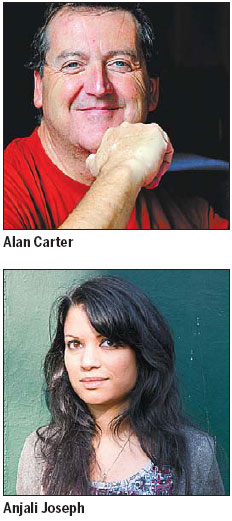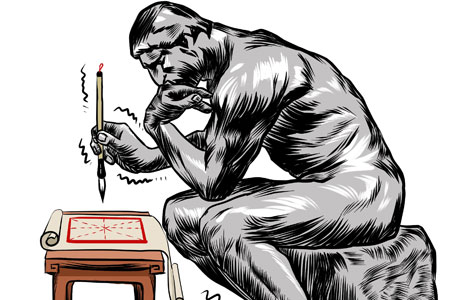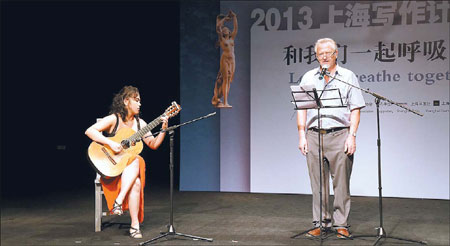The write experience
Updated: 2013-09-20 15:37
By Matt hodges (China Daily)
|
|||||||||||
A program brings foreign writers to Shanghai to help shape their works
Some came with specific goals: To find good places to kill, to get lost or to discover new characters. Others just came armed with an open mind.
But more so than in the past, the eight men and women attending this year's foreign writers' residency program, sponsored by the Shanghai Writers' Association, have the potential to complete their tacit mandate of helping the city spread its culture to foreign shores.
Shanghai has many ways of promoting itself beyond China's borders. Some are epic in scope or funding, such as the 2010 World Expo, the Shanghai Formula One Grand Prix or Chinese-South Korean film co-productions set in the city. Others, like this, are more niche market - unless one of the writers strikes gold and produces a bestseller.
For Alan Carter, the two-month-long program that began from Sept 1 is allowing him to synchronize his own living tutorial on the city with that of his hero-protagonist Cato Kwong. Carter is working on his third book of a series. In it, Cato, a Chinese-Australian detective, travels to Shanghai to discover his Chinese roots.
"So he'll learn about as much as I will while I'm here," the British-born Australian says, adding that his primary goal as an author will be "looking for good places and good ways to kill people".
According to Sun Yong, the association's vice-president, the idea was to bring a group of published writers from around the world and integrate them into local communities.
"They won't live in a hotel, cut off and isolated, but in normal neighborhoods with normal people. We give them a stipend so they can shop for food at local markets and go home and cook like Shanghai citizens," he said ahead of the program's official opening ceremony on Sept 2 at the Shanghai Dramatic Arts Center.
"We don't require them to write anything. We just want them to experience life here and write about whatever they're interested in. After all, they're writers - we can't give them orders."
Wang Anyi, chair of the association and one of China's most celebrated women novelists, believes the city's charms may find expression in new literary outpourings from its temporary guests. One of her books, The Song of Everlasting Sorrow, was shortlisted for the Man Booker International Prize in 2011.
"We hope to hear their opinions about the city and see the influence of Shanghai reflected in their writing," the Nanjing native says.
"I don't think I can give an objective account of the city anymore because I've lived here so long."
The foreign writers were invited from countries as far flung as India, Argentina, Mexico and Belgium.
Three share a common first language in Spanish, one is Portuguese and another has lived as an expat in Spain for more than two decades - adding a Latin flair to the writer's circle.
The one African invitee, Nigerian playwright and poet Zainabu Jallo, was unable to attend due to ill health. Cuban-American poet and journalist Victor Rodriguez Nunez will arrive in a few weeks.
Their de facto task: To acclimatize to Shanghai's frenetic pace of life and idiosyncrasies and, hopefully, be inspired. Whether they like it or not, they are unlikely to avoid certain rites of passage along the way. Misconceptions are also likely to have a short shelf life.
Mexican poet and novelist Lina Zeron was already ahead of the pack within 24 hours of leaving Pudong International Airport.
"I got lost this morning and walked in the wrong direction for one hour. A Chinese lady found me in the park and tried to walk me home, but then she got lost, too," she says.
Claiming to have read exhaustively about China before arriving, she says the abundance of short skirts and exposed flesh left her reeling.
"They say that girls here are repressed," she says, rolling her eyes.
"But I think maybe it's even more (relaxed) here than in Mexico."
Bewildered by the barrage of neon signage, she ate her first dinner at Starbucks. She then provided a checklist of headaches commonly encountered by foreigners: Taxi drivers pretending you are invisible, problems communicating in English and so forth.
"I'm going to write about my experience here: 'Big Brother, Writers in Shanghai'," she punned, making a reference to the popular reality TV show about mismatched housemates that launched in 1999 and has since become a global franchise.
Joao Tordo, the only Portuguese author among finalists for the sixth European Union Prize for Literature last year, is putting the final touches on his seventh book. Tordo, who almost always sets his novels in different cities, says Shanghai's labyrinthine nature, unfathomable social codes and Olympic-level language barrier are actually blessings in disguise.
"As a writer, being able to go somewhere and get lost is precious," says Tordo, who is visiting Asia for the first time.
"Shanghai reminds me of New York, maybe back in the '70s, but run by people who follow a totally different set of rules. I'm so sick of big cities where everything is so planned, organized and boring. It's great to be here."

Although the 7-year-old program has not yet born particularly luscious fruit - Sun says previously invitees mostly wrote about their experiences in essay form - the organizers view it as a pioneering endeavor that is growing in scale and stature every year.
"Before we started this, we didn't have a writer's residency program in China," Sun says.
"We also hope it encourages reciprocal exchanges, thus giving hope to our young writers."
Certainly, more Chinese writers are either winning or being shortlisted for literary prizes in recent years.
Jiang Rong claimed the inaugural Man Asian literary prize in 2007 with his illuminating Wolf Totem, which is being made into a film directed by Jean-Jacques Annaud. Su Tong won the same prize in 2009 for his political fable The Boat to Redemption, about a playboy government official who castrates himself. And Bi Feiyu made it a hat-trick in 2011 when he claimed Asia's top literary prize for his "cultural revolution" (1966-76)-era Three Sisters.
For the first time this year, the association is co-hosting the program with the dramatic arts center. This facilitated some memorable performances from both foreign and native writers on Monday evening.
Germain Droogenbroodt, a Flemish poet born in Belgium, recited some of his works while a Chinese woman provided accompaniment on a Spanish guitar. Later, a middle-aged Chinese man performed a moving rendition of a local work that touched on themes of memory, loss and death.
For Irish novelist Denyse Woods, the program has enabled her to rededicate herself to the craft of fiction writing on a subsidized sojourn in an exciting new milieu.
"Today's the start of my new life as a real writer again," she says.
"I certainly look forward to writing about Shanghai and setting a story here."
Droogenbroodt, whose poems are infused by Chinese philosophy, says he will give lectures and recitals at venues like Fudan University. Lamenting what he perceives as the loss of traditional "roots" in modern China, he says: "I'm not at all nationalistic, but where people should be nationalistic, if at all, is in preserving their own cultural beauty. There is too much American influence on modern Chinese poetry."
Wang says exchanges with foreign writers also help local authors understand other cultures and avoid embarrassing social faux pas or literary gaffes.
"We're always trying to better our understanding," she says.
sundayed@chinadaily.com.cn
|
Germain Droogenbroodt, a Flemish poet born in Belgium, recites his works while a young Chinese accompanies him on a Spanish guitar. Photos Provided to China Daily |
(China Daily European Weekly 09/20/2013 page26)
Today's Top News
CNOOC offering 25 blocks for cooperation
Li plans to seek deeper trust with neighbors
Obama to name Yellen as next Fed chair
Obama says he'll negotiate once 'threats' end
Xi calls for more APEC connectivity
Hey, big Chinese spenders
Wet weather fails to dampen FTZ interest
Service-sector expansion slows
Hot Topics
Lunar probe , China growth forecasts, Emission rules get tougher, China seen through 'colored lens', International board,
Editor's Picks

|

|

|

|

|

|






